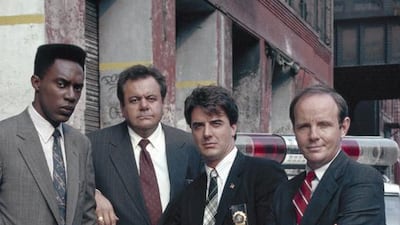In TV land, once you’ve created a cash cow, the next question is a no-brainer: How can we milk it for all it’s worth? Soon the spin-offs, prequels and sequels are flying out the studio door, and you’ve created a franchise.
It’s the art of looking a little bit different while selling more of the same goods in the comfortable, familiar universe that viewers crave – and television has been doing it almost since the dawn of programming. It’s in the life-and-death arena of cops, victims and courtrooms where franchises have spun platinum.
The Methuselah of the criminal-justice brood is Law & Order, created by Dick Wolf, which aired 456 episodes over 20 seasons from 1990 to 2010. The franchise further gave us Law & Order: Special Victims Unit, Law & Order: Criminal Intent, Law & Order: Trial by Jury and Law & Order: LA. As of May, 1,073 original episodes of the franchise had aired. And don't forget the five video games based on the Law & Order universe. But that's not all. On the horizon looms Law & Order: True Crime, a scripted series that will chronicle famous, real-life cases, beginning with the Menendez brothers' murders this autumn. And then there's Law & Order: You The Jury, Wolf's live courtroom series, currently in development at NBC.
Wolf and his creative partners have also tapped the windy city with their concurrently airing Chicago franchise, his newest licence to print money, which includes: Chicago Fire, Chicago PD, Chicago Med and the upcoming Chicago Justice, where popular characters enjoy crossovers galore as they save lives and prosecute the baddies.
Another long-term success worth noting has been Anthony E Zuiker's phenomenal CSI forensics franchise, CSI: Crime Scene Investigation, CSI: Miami and CSI: NY, although the fourth offering, CSI: Cyber, was cancelled last month after only two seasons, perhaps because it strayed too far from the original formula.
While many franchises have grown profitably, the risk of saturation and failure has never been stronger. “There is simply too much television,” FX Networks chief executive John Landgraf flatly declared last year, with some 400 scripted series now on the air in North America alone and more on the way this year. The business “is in the late stages of a bubble. We’re seeing a desperate scrum, everyone is trying to jockey for position.”
For this reason alone, a beloved franchise can be golden – a way to stand out in a crowd of hungry competitors and increase the odds of solid ratings and success.
However, even with a brand as durable as Criminal Minds, recently renewed by CBS for a 12th season, there can be a misfire.
First spin-off, Criminal Minds: Suspect Behavior, made its debut in 2011 with Forest Whitaker in the lead role but was cancelled after one season of paltry ratings.
Mark Gordon, producer of the newest spin-off, Criminal Minds: Beyond Borders, says his creative team learnt a valuable lesson from Suspect Behavior's failure. "[In 2011], we were trying too hard to be different," he lamented.
When you create a spin-off, “you want something that’s fresh and different, but at same time you want to honour the show you’re spinning off from”.
After some fine-tuning to ensure the right kind of case takes place in a new country each week, Gordon is pleased that Beyond Borders now fits "correctly in the Criminal Minds family, but with its own identity".
artslife@thenational.ae

